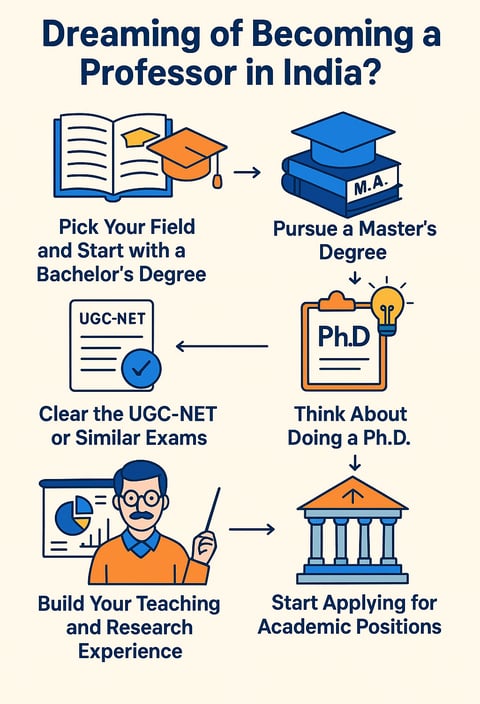Complete Guide to Becoming a Professor in India
Ashutosh Singh
4/26/20253 min read


Complete Guide to Becoming a Professor in India
If you’ve ever dreamed of standing at a podium, inspiring minds, and shaping the future, becoming a professor might just be your calling. In India, it’s not only a prestigious profession but also a deeply fulfilling one, blending a love for teaching with a commitment to research and academic excellence.
Whether you’re a student mapping out your career path or a working professional looking to transition into academia, this step-by-step guide will help you understand everything you need to know to get there.
Step 1: Pick Your Field and Start with a Bachelor's Degree
The first step is simple — choose a subject you're passionate about.
Enroll in a Bachelor’s program (like B.A., B.Sc., B.Com., etc.) related to your area of interest. Your undergraduate journey usually lasts three to four years and lays the foundation for everything that follows.
Pro Tip: Aim for at least 55-60% marks to keep your options wide open for higher studies!
Step 2: Level Up with a Master's Degree
After your bachelor's degree, the next milestone is a Master's (M.A., M.Sc., M.Com., etc.).
This advanced study helps deepen your expertise in your chosen field — and it’s essential for most academic roles in colleges and universities.
Once again, maintaining a minimum of 55-60% is important to stay eligible for competitive exams and future academic posts.
Step 3: Clear the UGC-NET or Similar Exams
If you’re serious about becoming an Assistant Professor, you’ll need to crack the UGC-NET (University Grants Commission - National Eligibility Test).
This exam evaluates your teaching skills, research aptitude, and subject knowledge.
Important Update:
UGC-NET is mandatory for most candidates with non-professional Master's degrees.
Those with professional degrees like M.E. or M.Tech might be exempt, depending on specific guidelines.
Step 4: Think About Doing a Ph.D.
While a Ph.D. isn’t always a must for entry-level teaching jobs, it’s definitely a game-changer for climbing the academic ladder.
A Ph.D. involves original research and adds serious weight to your academic profile.
Most universities now require a Ph.D. for promotions to higher positions like Associate Professor and beyond.
Step 5: Build Your Teaching and Research Experience
Want to stand out? Get hands-on experience!
During your postgrad and Ph.D. years, get involved in teaching assistantships, publish research papers, present at conferences, and collaborate on academic projects.
This real-world exposure will sharpen your skills — and your CV — for a thriving academic career.
Step 6: Start Applying for Academic Positions
Once you have the right qualifications and experience, it’s time to hit the job market.
Look for openings at government colleges, private universities, research institutions, and even emerging online education platforms.
Stay updated through academic job portals, university websites, and LinkedIn!
Academic Career Ladder in India
Here’s how the typical academic hierarchy looks in Indian higher education:
Assistant Professor: Entry-level. Requires a Master's and UGC-NET qualification.
Associate Professor: Requires a Ph.D., a good teaching record, several research publications — sometimes, guiding at least one Ph.D. student.
Professor: The highest honor! Needs extensive research, notable publications, and years of academic contributions.
Note: Criteria may vary slightly from one institution to another.
What About Salaries and Perks?
Here’s the exciting part — the compensation is pretty solid:
Academic Rank Salary Range (per month) Assistant Professor ₹57,700 – ₹2,11,500 Associate Professor ₹1,31,400 – ₹2,18,200 Professor ₹1,44,200 – ₹2,18,200
Plus, many institutions offer additional benefits like:
Housing or HRA allowances
Research grants
Retirement and pension plans
Conference travel support
Final Thoughts
Becoming a professor in India isn’t just about passing exams or earning degrees — it’s about a lifetime of learning, curiosity, and passion for teaching.
If you stay focused, keep building your skills, and never stop learning, you’ll not only land your dream role but also leave a lasting impact on generations of students.
Follow the LinkedIn Page for updates- https://www.linkedin.com/company/exnods

